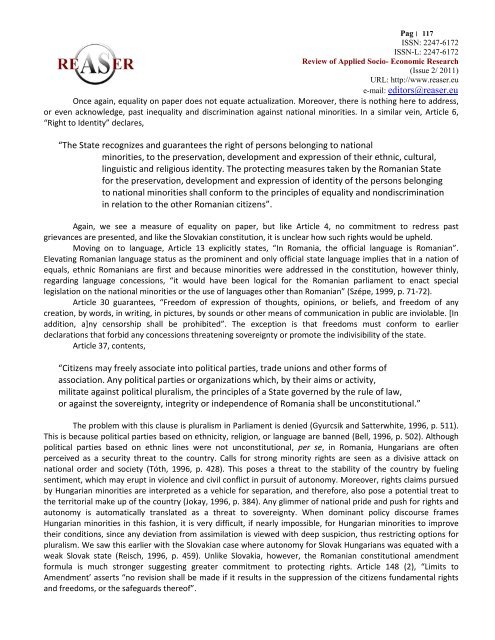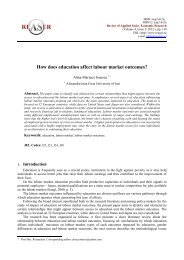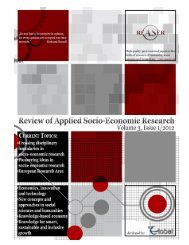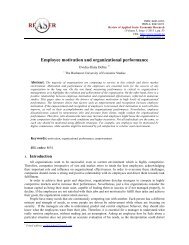Volume 2, ISSUE2/2011 - Review of Applied Socio-Economic ...
Volume 2, ISSUE2/2011 - Review of Applied Socio-Economic ...
Volume 2, ISSUE2/2011 - Review of Applied Socio-Economic ...
You also want an ePaper? Increase the reach of your titles
YUMPU automatically turns print PDFs into web optimized ePapers that Google loves.
Pag׀ 117 ISSN: 2247-6172ISSN-L: 2247-6172<strong>Review</strong> <strong>of</strong> <strong>Applied</strong> <strong>Socio</strong>- <strong>Economic</strong> Research(Issue 2/ <strong>2011</strong>)URL: http://www.reaser.eue-mail: editors@reaser.euOnce again, equality on paper does not equate actualization. Moreover, there is nothing here to address,or even acknowledge, past inequality and discrimination against national minorities. In a similar vein, Article 6,“Right to Identity” declares,“The State recognizes and guarantees the right <strong>of</strong> persons belonging to nationalminorities, to the preservation, development and expression <strong>of</strong> their ethnic, cultural,linguistic and religious identity. The protecting measures taken by the Romanian Statefor the preservation, development and expression <strong>of</strong> identity <strong>of</strong> the persons belongingto national minorities shall conform to the principles <strong>of</strong> equality and nondiscriminationin relation to the other Romanian citizens”.Again, we see a measure <strong>of</strong> equality on paper, but like Article 4, no commitment to redress pastgrievances are presented, and like the Slovakian constitution, it is unclear how such rights would be upheld.Moving on to language, Article 13 explicitly states, “In Romania, the <strong>of</strong>ficial language is Romanian”.Elevating Romanian language status as the prominent and only <strong>of</strong>ficial state language implies that in a nation <strong>of</strong>equals, ethnic Romanians are first and because minorities were addressed in the constitution, however thinly,regarding language concessions, “it would have been logical for the Romanian parliament to enact speciallegislation on the national minorities or the use <strong>of</strong> languages other than Romanian” (Szépe, 1999, p. 71-72).Article 30 guarantees, “Freedom <strong>of</strong> expression <strong>of</strong> thoughts, opinions, or beliefs, and freedom <strong>of</strong> anycreation, by words, in writing, in pictures, by sounds or other means <strong>of</strong> communication in public are inviolable. [Inaddition, a]ny censorship shall be prohibited”. The exception is that freedoms must conform to earlierdeclarations that forbid any concessions threatening sovereignty or promote the indivisibility <strong>of</strong> the state.Article 37, contents,“Citizens may freely associate into political parties, trade unions and other forms <strong>of</strong>association. Any political parties or organizations which, by their aims or activity,militate against political pluralism, the principles <strong>of</strong> a State governed by the rule <strong>of</strong> law,or against the sovereignty, integrity or independence <strong>of</strong> Romania shall be unconstitutional.”The problem with this clause is pluralism in Parliament is denied (Gyurcsik and Satterwhite, 1996, p. 511).This is because political parties based on ethnicity, religion, or language are banned (Bell, 1996, p. 502). Althoughpolitical parties based on ethnic lines were not unconstitutional, per se, in Romania, Hungarians are <strong>of</strong>tenperceived as a security threat to the country. Calls for strong minority rights are seen as a divisive attack onnational order and society (Tóth, 1996, p. 428). This poses a threat to the stability <strong>of</strong> the country by fuelingsentiment, which may erupt in violence and civil conflict in pursuit <strong>of</strong> autonomy. Moreover, rights claims pursuedby Hungarian minorities are interpreted as a vehicle for separation, and therefore, also pose a potential treat tothe territorial make up <strong>of</strong> the country (Jokay, 1996, p. 384). Any glimmer <strong>of</strong> national pride and push for rights andautonomy is automatically translated as a threat to sovereignty. When dominant policy discourse framesHungarian minorities in this fashion, it is very difficult, if nearly impossible, for Hungarian minorities to improvetheir conditions, since any deviation from assimilation is viewed with deep suspicion, thus restricting options forpluralism. We saw this earlier with the Slovakian case where autonomy for Slovak Hungarians was equated with aweak Slovak state (Reisch, 1996, p. 459). Unlike Slovakia, however, the Romanian constitutional amendmentformula is much stronger suggesting greater commitment to protecting rights. Article 148 (2), “Limits toAmendment’ asserts “no revision shall be made if it results in the suppression <strong>of</strong> the citizens fundamental rightsand freedoms, or the safeguards there<strong>of</strong>”.








